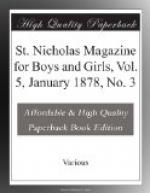And now comes the Worshipful Company of Bakers, preceded by their banner, with its good old motto, “Praise God for all.” These are really very jolly and well-favored looking companions, most of the members bearing large bouquets of flowers. After them the Vintners’ Company, with the band of the Royal Artillery; ten Commissioners, each bearing a shield; eight master porters in vintner’s dress; the Bargemaster in full uniform, and the Swan Uppers. These are men who look after the swans belonging to the corporation of London, which build their nests along the banks of the Thames, and they mark the young swans each spring.
The “Uppers” look very well in their dress, consisting of dark cloth jackets slashed with white, blue and white striped jerseys and white trousers.
After this company had passed, a grand shout announced the coming of the elephants. These, as some small boy has observed, are “curious animals, with two tails—one before and one behind.” First came a number of large ones, with Mr. Sanger, their owner, who was mounted on a curiously spotted horse. They were gorgeous with oriental trappings and howdahs. On the foremost one rode a man representing a grand Indian prince. He had a reddish mustache, wore spectacles, a magnificent purple and white turban, and showy oriental costume. He produced a great impression on the crowd. In other howdahs sat one, two or three splendid Hindoos, whose dress was past description. Then came several young elephants ridden by boys; one of these was seized with a desire to lie down, and had to be vigorously roused; but, on the whole, they behaved in a wonderfully correct and dignified manner—now and then gracefully swinging round their trunks amongst the sympathizing crowd, in search of refreshment.
The elephants were escorted by equestrians in state costumes, and followed by six knights in steel armor, with lances and pennons, mounted on chargers. One of these “wouldn’t go,” and had to be dragged on ignominiously by a policeman. Then the Epping Forest rangers came. They were picturesquely dressed in green velvet coats, broad-brimmed hats and long feathers. After these, trumpeters, under-sheriffs in their state carriages, aldermen, the Recorder, more trumpeters, and then a most gorgeous coach—with hammer-cloth of red and gold, men in liveries too splendid to describe, and four fine horses—brings the late lord mayor. The mounted band of household cavalry follows. These really look splendid in crimson coats covered with gold embroidery and velvet caps, riding handsome white horses.
There is a stoppage just as they come up. They are rapturously greeted by the crowd, and requested to “play up.” The mayor’s servants, in state liveries, follow on foot. After them rides a very important person, the city marshal, on horseback. The city trumpeters come now, preceding the right honorable the lord mayor’s most gorgeous gilt coach, drawn by six horses. In it sits Sir Thomas White, supported by his chaplain, and attended by his sword-bearer and the common crier. An escort of the 21st Hussars brings up the rear. Policemen follow, and after them a stray mail-cart, a butcher’s boy with his tray; after that, not just the deluge, but the crowd.




